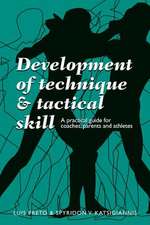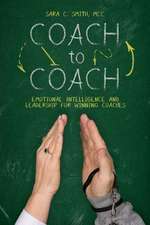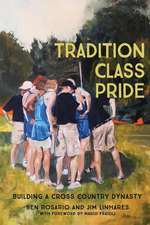Qualitative Research in Sport and Physical Activity
Autor Ian Jones, Lorraine Brown, Immy Hollowayen Limba Engleză Paperback – 18 noi 2012
• ethics
• choosing your an approach
• methods of data collection
• analysing the data
• writing up and disseminating your findings.
This is essential reading for undergraduate and Masters students carrying out a qualitative research project in sport and physical activity and for PhD students looking to refresh their knowledge.
Preț: 487.43 lei
Nou
Puncte Express: 731
Preț estimativ în valută:
93.27€ • 97.64$ • 77.17£
93.27€ • 97.64$ • 77.17£
Carte tipărită la comandă
Livrare economică 05-19 aprilie
Preluare comenzi: 021 569.72.76
Specificații
ISBN-13: 9781446207451
ISBN-10: 1446207455
Pagini: 240
Dimensiuni: 170 x 242 x 17 mm
Greutate: 0.41 kg
Ediția:New.
Editura: SAGE Publications
Colecția Sage Publications Ltd
Locul publicării:London, United Kingdom
ISBN-10: 1446207455
Pagini: 240
Dimensiuni: 170 x 242 x 17 mm
Greutate: 0.41 kg
Ediția:New.
Editura: SAGE Publications
Colecția Sage Publications Ltd
Locul publicării:London, United Kingdom
Recenzii
This is a 'must have' book for aspiring qualitative researchers in the field of sport and physical activity. The book is well structured, providing the researcher with a step-by-step guide to the processes that need to occur to undertake methodologically sound qualitative research. It is intellectual and yet pragmatic which makes this a book that I will recommend to my PhD students and colleagues alike.
Murray Drummond
Professor in Sport, Health and Physical Education, Flinders University
This text provides students with an excellent foundation for understanding qualitative research studies and for conducting their own qualitative inquiries, in fields ranging from sport management and marketing to sport sociology and psychology.
Paul M. Pedersen
Professor and Director, Sport Management Doctoral Program, Indiana University-Bloomington
Murray Drummond
Professor in Sport, Health and Physical Education, Flinders University
This text provides students with an excellent foundation for understanding qualitative research studies and for conducting their own qualitative inquiries, in fields ranging from sport management and marketing to sport sociology and psychology.
Paul M. Pedersen
Professor and Director, Sport Management Doctoral Program, Indiana University-Bloomington
Cuprins
PART ONE: INTRODUCING QUALITATIVE RESEARCH IN SPORT
Qualitative Research and Its Use in Sport and Physical Activity
The Main Characteristics of Qualitative Research
Qualitative Research in Sport and Physical Activity
Ethical Considerations in Research
Recruiting Participants
Informed Consent
Confidentiality and Anonymity
Avoiding Harm
Developing the Research Question and Writing the Proposal
The topic and Research Question
Writing the Proposal
The Role of the Literature in Qualitative Research
The Literature and the Proposal
The Literature Overview
The Inductive Approach
The Ongoing Dialogue with the Literature
Keeping Track of References
Sampling
Purposive Sampling
Sampling Types
Sampling Decisions
Accessing the Sample
Referring to the Sample
PART TWO: COLLECTING QUALITATIVE DATA
Interviews
Types of Interview
Variety of Interviews
Asking Questions
Interviewing Skills
The Relationship Between Interviewer and Participants
Practical Sspects of Interviewing
Potential Problems in Interviewing
Focus Groups
The Origin and Purpose of Focus Groups
Choosing the Sample: Size, Number and Composition
Conducting Focus Group Interviews
The Involvement of the Interviewer
Analysing Focus Group Data
Ethical Issues
Advantages and Limitations of Focus Groups
Participant Observation
The research Setting
Types of Observation
Getting Started
Keeping a Record
Using Documentary Sources of Data
Problematic Issues
PART THREE: CHOOSING THE RESEARCH APPROACH
Grounded Theory
The Origins of Grounded Theory
The Main Elements of Grounded Theory
The Process of GT: Data Collection and Analysis
The Developing Theory
Problems in Grounded Theory
Ethnography
Fieldwork
A Focus on Culture
Ethnographic Methods
Sample and Setting
The Ethnographic Record
Analysis and Interpretation
Problems in Conducting Ethnographic Research
Phenomenology
Descriptive and Interpretive Phenomenology
Eliciting Life-World Descriptions
The Use of Bracketing and Sensitising
The Findings of Phenomenological Research
Sampling
Phenomenological Interviews
Analysis in Descriptive and Hermeneutic Phenomenology
Interpretative Phenomenological Analysis (IPA)
Limitations
Narrative Research
Stories and Their Structure
Types of Story
The Functions of People’s Stories
Collecting Data
Narrative Analysis
The Distinctive Nature of Narrative Research
A Critique of Narrative Research
Mixed Methods Research
Adopting Mixed Methods Research
Designing Mixed Methods Research
The problems Inherent in Mixed Methods Research
PART FOUR: ANALYSING AND REPORTING QUALITATIVE DATA
Data Analysis
Managing the Data
Transcribing and Writing Memos
Data Reduction and Conceptualisation: Codes, Categories and Themes
Computer-aided Analysis of Qualitative Data
Interpreting the Data
The Quality of Qualitative Inquiry
Validity and Reliability
Alternative Criteria for Qualitative Research
How to Ensure Trustworthiness
Writing Up Qualitative Research
Writing in the First Person
The Format of the Report
Checklist Before Submission
Telling the Tale: Creativity and Originality
Publishing and Presenting the Research
Glossary
References
Index
Qualitative Research and Its Use in Sport and Physical Activity
The Main Characteristics of Qualitative Research
Qualitative Research in Sport and Physical Activity
Ethical Considerations in Research
Recruiting Participants
Informed Consent
Confidentiality and Anonymity
Avoiding Harm
Developing the Research Question and Writing the Proposal
The topic and Research Question
Writing the Proposal
The Role of the Literature in Qualitative Research
The Literature and the Proposal
The Literature Overview
The Inductive Approach
The Ongoing Dialogue with the Literature
Keeping Track of References
Sampling
Purposive Sampling
Sampling Types
Sampling Decisions
Accessing the Sample
Referring to the Sample
PART TWO: COLLECTING QUALITATIVE DATA
Interviews
Types of Interview
Variety of Interviews
Asking Questions
Interviewing Skills
The Relationship Between Interviewer and Participants
Practical Sspects of Interviewing
Potential Problems in Interviewing
Focus Groups
The Origin and Purpose of Focus Groups
Choosing the Sample: Size, Number and Composition
Conducting Focus Group Interviews
The Involvement of the Interviewer
Analysing Focus Group Data
Ethical Issues
Advantages and Limitations of Focus Groups
Participant Observation
The research Setting
Types of Observation
Getting Started
Keeping a Record
Using Documentary Sources of Data
Problematic Issues
PART THREE: CHOOSING THE RESEARCH APPROACH
Grounded Theory
The Origins of Grounded Theory
The Main Elements of Grounded Theory
The Process of GT: Data Collection and Analysis
The Developing Theory
Problems in Grounded Theory
Ethnography
Fieldwork
A Focus on Culture
Ethnographic Methods
Sample and Setting
The Ethnographic Record
Analysis and Interpretation
Problems in Conducting Ethnographic Research
Phenomenology
Descriptive and Interpretive Phenomenology
Eliciting Life-World Descriptions
The Use of Bracketing and Sensitising
The Findings of Phenomenological Research
Sampling
Phenomenological Interviews
Analysis in Descriptive and Hermeneutic Phenomenology
Interpretative Phenomenological Analysis (IPA)
Limitations
Narrative Research
Stories and Their Structure
Types of Story
The Functions of People’s Stories
Collecting Data
Narrative Analysis
The Distinctive Nature of Narrative Research
A Critique of Narrative Research
Mixed Methods Research
Adopting Mixed Methods Research
Designing Mixed Methods Research
The problems Inherent in Mixed Methods Research
PART FOUR: ANALYSING AND REPORTING QUALITATIVE DATA
Data Analysis
Managing the Data
Transcribing and Writing Memos
Data Reduction and Conceptualisation: Codes, Categories and Themes
Computer-aided Analysis of Qualitative Data
Interpreting the Data
The Quality of Qualitative Inquiry
Validity and Reliability
Alternative Criteria for Qualitative Research
How to Ensure Trustworthiness
Writing Up Qualitative Research
Writing in the First Person
The Format of the Report
Checklist Before Submission
Telling the Tale: Creativity and Originality
Publishing and Presenting the Research
Glossary
References
Index
Notă biografică
Descriere
Designed especially for students in sport and physical activity, this book provides a detailed guide to planning, undertaking, and writing up qualitative research. It's a coherent and accessible guide through the research process, using numerous examples to bring research alive.


















